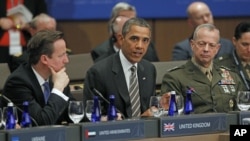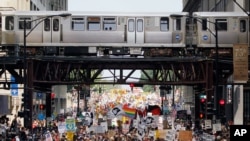CHICAGO - President Barack Obama says the world has a vital interest in the long-term success of the NATO mission in Afghanistan. NATO has reaffirmed plans to hand over combat operations to Afghanistan's military next year.
President Obama and NATO Secretary General Anders Fogh Rasmussen presided over discussions involving members of the International Security Assistance Force (ISAF).
The session included nations whose logistical and financial support will be crucial to sustaining Afghanistan's military after the scheduled December 31, 2014 target to withdraw all foreign combat forces, currently numbering about 130,000 troops.
Obama was seated next to the ISAF commander, U.S. Marine Corps General John Allen. Afghanistan’s President Hamid Karzai sat next to NATO Secretary General Anders Fogh Rasmussen at the large circular table.
Saying the presence of so many countries illustrated the international nature of the mission, Obama declared the transition to Afghan-led security well underway, and spoke about the next milestone.
"We will set a goal for Afghan forces to take the lead for combat operations across the country in 2013, next year, so that ISAF can move to a supporting role," said the U.S. president. "This will be another step [in] Afghan Forces taking full lead for their security as agreed to by 2014 when the ISAF combat operation will end."
Obama made a point of noting the presence of officials from Russia and Central Asian countries that he said provide critical transit for ISAF supplies in and out of Afghanistan.
A top U.S. official said the United States and Pakistan are discussing efforts to reopen NATO supply routes from Pakistan into Afghanistan.
In an interview with VOA's Urdu Service Monday, Ambassador Marc Grossman said negotiations have been underway for weeks. Grossman, the U.S. envoy for Pakistan and Afghanistan, said negotiators are "working away."
Islamabad suggested last week it would soon reopen the ground supply routes to U.S. and NATO forces in Afghanistan. Pakistan closed them after U.S.-led airstrikes mistakenly killed 24 Pakistani soldiers along the Afghan border last November.
Pakistan is seeking heavy taxes on future NATO convoys - a condition diplomatic sources say is hindering the talks.
Grossman rejected accusations that it was insulting for Pakistani President Asif Ali Zardari to attend the NATO summit and not meet with President Barack Obama on the sidelines.
A major NATO objective on Monday was agreeing on reliable commitments to help support Afghanistan going forward to make sure that, as Obama put it, "hard-won progress is preserved."
"Today we can agree on NATO's long-term relationship with Afghanistan beyond 2014, including our support of Afghan security forces," he said.
NATO Secretary General Rasmussen said ISAF played
a vital role in denying terrorists a safe haven in Afghanistan, and now the world must help ensure a secure and democratic Afghanistan in a stable region.
"By the end of 2014 the ISAF operation will terminate and the NATO-led combat mission will end. But our commitment is for the long term," said Rasmussen. "From 2015 we expect to maintain a NATO-led presence to train, advise and assist the Afghan security forces and NATO, and ISAF nations will also pay their share to help sustain the army and police Afghanistan needs for the coming years.
"Sustaining Afghan government forces beyond 2014 is estimated to cost about $4 billion. After shouldering the bulk of the financial burden for so many years, the United States is seeking $1.3 billion in commitments.
Without mentioning specific numbers, White House official Ben Rhodes told reporters NATO is "far along on the path" to achieving the $1.3 billion objective.
The final summit declaration calls for the international community to commit to the long-term sustainment of Afghanistan's security forces, saying funding will be guided by principles including transparency, accountability, cost effectiveness and measures against corruption.
President Obama and NATO Secretary General Anders Fogh Rasmussen presided over discussions involving members of the International Security Assistance Force (ISAF).
The session included nations whose logistical and financial support will be crucial to sustaining Afghanistan's military after the scheduled December 31, 2014 target to withdraw all foreign combat forces, currently numbering about 130,000 troops.
Obama was seated next to the ISAF commander, U.S. Marine Corps General John Allen. Afghanistan’s President Hamid Karzai sat next to NATO Secretary General Anders Fogh Rasmussen at the large circular table.
Saying the presence of so many countries illustrated the international nature of the mission, Obama declared the transition to Afghan-led security well underway, and spoke about the next milestone.
"We will set a goal for Afghan forces to take the lead for combat operations across the country in 2013, next year, so that ISAF can move to a supporting role," said the U.S. president. "This will be another step [in] Afghan Forces taking full lead for their security as agreed to by 2014 when the ISAF combat operation will end."
Obama made a point of noting the presence of officials from Russia and Central Asian countries that he said provide critical transit for ISAF supplies in and out of Afghanistan.
US Envoy: US, Pakistan Discuss Supply Routes
Ambassador Grossman: US, Pakistan Discuss Supply RoutesA top U.S. official said the United States and Pakistan are discussing efforts to reopen NATO supply routes from Pakistan into Afghanistan.
In an interview with VOA's Urdu Service Monday, Ambassador Marc Grossman said negotiations have been underway for weeks. Grossman, the U.S. envoy for Pakistan and Afghanistan, said negotiators are "working away."
Islamabad suggested last week it would soon reopen the ground supply routes to U.S. and NATO forces in Afghanistan. Pakistan closed them after U.S.-led airstrikes mistakenly killed 24 Pakistani soldiers along the Afghan border last November.
Pakistan is seeking heavy taxes on future NATO convoys - a condition diplomatic sources say is hindering the talks.
Grossman rejected accusations that it was insulting for Pakistani President Asif Ali Zardari to attend the NATO summit and not meet with President Barack Obama on the sidelines.
"Today we can agree on NATO's long-term relationship with Afghanistan beyond 2014, including our support of Afghan security forces," he said.
NATO Secretary General Rasmussen said ISAF played
a vital role in denying terrorists a safe haven in Afghanistan, and now the world must help ensure a secure and democratic Afghanistan in a stable region.
"By the end of 2014 the ISAF operation will terminate and the NATO-led combat mission will end. But our commitment is for the long term," said Rasmussen. "From 2015 we expect to maintain a NATO-led presence to train, advise and assist the Afghan security forces and NATO, and ISAF nations will also pay their share to help sustain the army and police Afghanistan needs for the coming years.
"Sustaining Afghan government forces beyond 2014 is estimated to cost about $4 billion. After shouldering the bulk of the financial burden for so many years, the United States is seeking $1.3 billion in commitments.
Without mentioning specific numbers, White House official Ben Rhodes told reporters NATO is "far along on the path" to achieving the $1.3 billion objective.
The final summit declaration calls for the international community to commit to the long-term sustainment of Afghanistan's security forces, saying funding will be guided by principles including transparency, accountability, cost effectiveness and measures against corruption.






